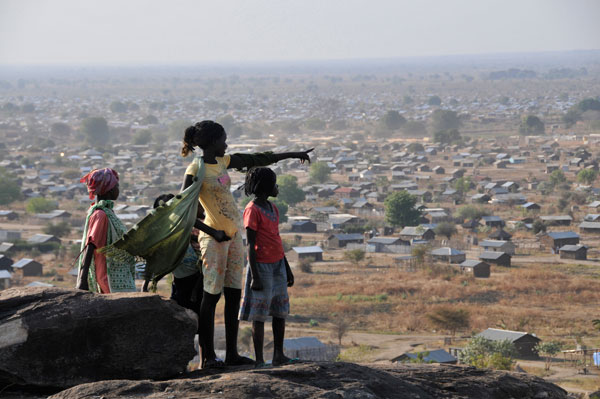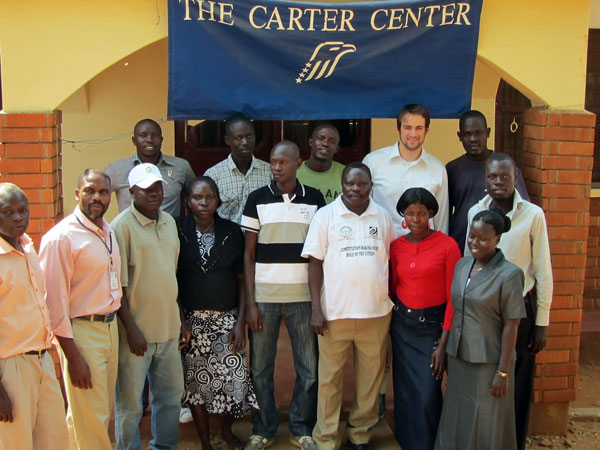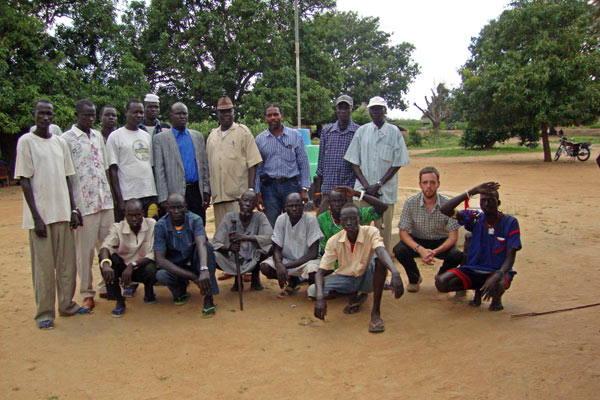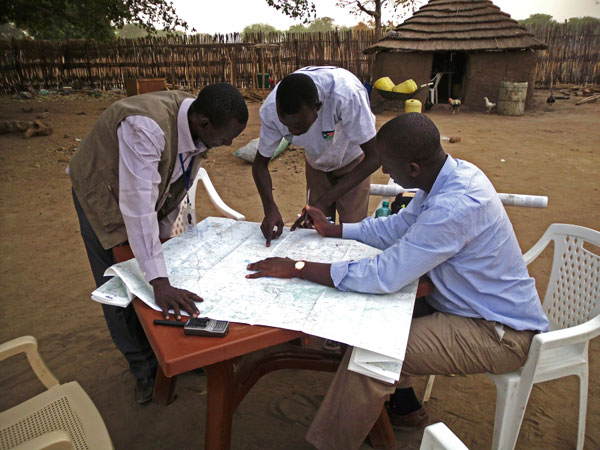The Carter Center's peace programs have retained a presence in South Sudan after observing the 2011 referendum on independence in the hopes of contributing to a lasting peace and the establishment of strong democratic foundations. The country faces many challenges as it struggles to establish itself as the world's newest nation. The excitement of independence has dissipated as political, economic, and security risks escalate, including border disputes with its northern neighbor Sudan; interethnic violence in South Sudan; and unresolved conflict about distribution of oil revenues that has resulted in the shut-down of the oil pipeline and 98 percent of the country's income.

Girls look out over Juba, the capital of South Sudan. (Photo: D. Hakes/The Carter Center)
"The most important thing the people of South Sudan need as a basis for a successful future is peace," said Jeffrey Mapendere, field office director for the Center in South Sudan. "We want to help them achieve this and to cement the democracy they have aspired to for many years."
Based in Juba, The Carter Center analyzes disputes in an effort to understand and reduce potential conflicts. The Center is the only international organization with regular communication with the predominantly Nuer rebel groups and has shared findings with government leadership in both Sudan and South Sudan, as well as with the international community through security forums.

Carter Center Field Office Director Jeffrey Mapendere (front row, second from left) stands with Carter Center staff in Juba, South Sudan, in December 2011. (Photo: The Carter Center)
In follow-up to its observation efforts on the 2011 referendum, the Center continues to observe and comment on the process to develop a new constitution and the drafting of key democratic legislation, offering recommendations to better reflect international best practices, such as consideration of term limits; preserving the independence of the National Elections Commission; and encouraging citizens to actively participate in public hearings and debate proposed legislation.
"We share our analysis with civil society and the government to strengthen understanding," said Mapendere. "We value local people's opinions and advice, and hope that our programming contributes toward building democracy and internal peace and unity."

Carter Center Field Office Director Jeffrey Mapendere (in blue striped shirt, standing) with the county commissioner and his men is in Thiet, Warrap state, South Sudan, during a visit by the Carter Center's Conflict Resolution Program to learn more about the disarmament process in June 2011. (Photo: The Carter Center)
The Carter Center has worked in Sudan for 26 years, starting with the Sasakawa-Global 2000 agricultural project in 1986. Since then, the Center has played a pivotal role in the region including helping to find ways to end Sudan's civil war, which led to the signing of the historic peace accord in 2005, and also the Guinea worm cease-fire in 1995 that allowed health workers to enter areas of Sudan previously inaccessible due to fighting. This cease-fire lasted almost six months, the longest such humanitarian cease-fire ever achieved.

Carter Center staff in Tonj South County, South Sudan, identify where Guinea worm-endemic villages are in relationship to ongoing regional conflicts, in order to detail their plans to travel to each village to develop conflict mitigation strategies with a strong understanding of local dynamics, to help with Guinea worm eradication. (Photo: The Carter Center)
"Everything depends on what has happened in the past," said Mapendere. "Trust doesn't just fall from the sky. Our work as an institution is well respected and appreciated. The Center has been very neutral with the people of Sudan, and now South Sudan. I think that's where the trust comes from."
The Carter Center is currently exploring how else it may contribute toward waging peace in South Sudan.
"Our work is about the human being. It is about peace and development, improving the quality of lives of the people. That, I think, is the bottom line. That's what we are doing; it's about the human being," said Mapendere.
Please sign up below for important news about the work of The Carter Center and special event invitations.